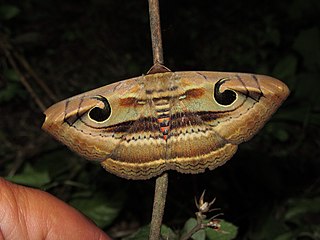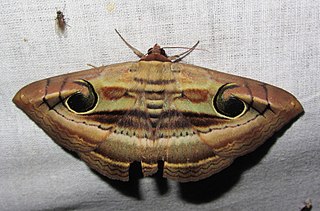Ulmus glaucescensFranch., the Gansu elm, is a small deciduous tree from the northern provinces of China, where it is found along river valleys and on mountain slopes at elevations of 2000–2600 m.

Carpobrotus glaucescens, commonly known as pigface or iceplant, is a species of flowering plant in the family Aizoaceae and is endemic to eastern Australia. It is a succulent, prostrate plant with stems up to 2 m long, glaucous leaves, daisy-like flowers with 100 to 150 light purple to deep pinkish-purple, petal-like staminodes and red to purple fruit. The fruits ripen mainly in Summer and Autumn. It usually only grows very close to the sea.

Spirama is a genus of moths in the family Erebidae first described by Achille Guenée in 1852.

Spirama griseisigma is a moth of the family Erebidae. It is found in Africa, including Zimbabwe.

Spirama recessa is a moth of the family Erebidae. It is found in New Guinea and tropical northern Australia.

Spirama kalaoensis is a species of moth of the family Erebidae. It is found on Sulawesi and Flores.

Spirama remota is a species of moth of the family Erebidae. It is found in Indonesia and New Guinea.

Spirama sumbana is a species of moth of the family Erebidae. It is found on Sumba.

Spirama retorta, the Indian owlet-moth, is a moth of the family Erebidae. The species was first described by Carl Alexander Clerck in 1764. It is found in China, Korea, Japan (Honshu), India, Nepal, Bangladesh, Thailand, Cambodia, Myanmar, Vietnam, Taiwan, Sri Lanka, Malaysia, the Philippines (Luzon), Indonesia ,Japan.
Spirama biformis is a species of moth of the family Erebidae. It is found in Indonesia (Moluccas).
Spirama capitulifera is a species of moth of the family Erebidae. It is found in Indonesia.
Spirama euphrages is a species of moth of the family Erebidae. It is found in Indonesia.
Spirama euspira is a species of moth of the family Erebidae. It was apparently proposed as a name for what Cramer misidentified as Spirama retorta in 1780. However, the identity of this species is unknown.
Spirama inconspicua is a species of moth of the family Erebidae. It is found in South Africa.

Spirama indenta is a species of moth of the family Erebidae first described by George Hampson in 1891. It is found from the Indian states of Assam and Meghalaya and from Sri Lanka to Java in Indonesia. In older texts, the species was classified as a morph of Spirama retorta.
Spirama miniata is a species of moth of the family Erebidae. It is found in South Africa, where it has been recorded from KwaZulu-Natal.
Spirama triloba is a species of moth of the family Erebidae. It is found in northern India, Bangladesh, Cambodia, the Philippines and Indonesia.

Spirama voluta is a species of moth of the family Erebidae. It is found in the Moluccas of Indonesia.
Spirama paecila is a species of moth of the family Erebidae. It is found in Brazil (Para).

Iris glaucescens is a plant species in the genus Iris, it is also in the subgenus Iris. It is a rhizomatous perennial, found in Russia, Kazakhstan, Mongolia and China. It has blue-grey sickle-shaped leaves, slender stem, and spring flowers in blue-violet, pale violet, lilac-purple, to deep purple, to light bluish, and almost white shades. It is rarely cultivated as an ornamental plant in temperate regions. It was merged with another similar iris in the region, and became a synonym of Iris scariosa, before being divided into two separate species again. Although some sources still call it a synonym of Iris scariosa.






